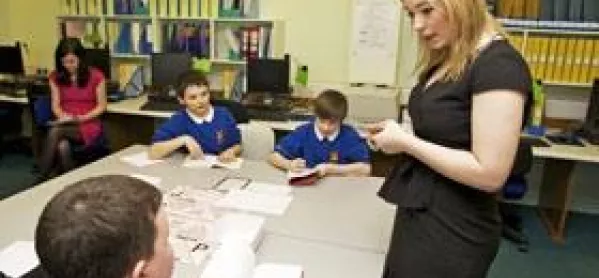Donaldson’s ideas are ‘driven forward’

The Scottish government has endorsed a report that sets tight deadlines for putting into practice the recommendations in Graham Donaldson’s report on teacher education. They include turning teaching into a master’s-level profession and establishing a Scottish College for Educational Leadership.
To “drive forward implementation”, a National Implementation Board has been established by the Scottish government - a central recommendation in the National Partnership Group report, published this week.
The board will be chaired by Professor Petra Wend, principal and vice- chancellor of Queen Margaret University in Edinburgh. Among its members will be the teaching unions, the Association of Directors of Education in Scotland, Cosla and the government.
The government has also announced pound;3 million to enable more teachers to benefit from master’s-level study in response to the report.
Those studying to become chartered teachers when the scheme was scrapped will be the first to benefit with pound;1 million earmarked to cover their course fees.
However, those who gain a master’s will receive no additional pay, triggering a stand-off between the government and the EIS teaching union, which is demanding “appropriate master’s-level pay”.
The NPG was set up to determine how the recommendations in Graham Donaldson’s report, Teaching Scotland’s Future, could be implemented
A revitalised system of professional review and development (PRD), the new system of professional update being introduced by the General Teaching Council of Scotland and closer partnership working between local authorities and universities are seen in the report as key to delivering high-quality teaching.
Online resources designed to support PRD are being designed and formal partnerships between universities and local authorities will be established by August, 2013, it states.
The partnership “while initially designed to better manage the education of students and probationary teachers can be extended to the benefit of a wider staff group”, the report states.
Every teacher will have an e-portfolio to record learning, and priorities will be published annually by the National Implementation Board. These might include Gaelic medium education, additional support needs or addressing new curricular priorities such as the commitment to languages, the report suggests.
The report charges local authorities with establishing “a baseline of teachers with master’s-level qualifications” so targets can be set to ensure progress. Councils are also instructed to identify heads without leadership qualifications and “provide access”.
A framework for educational leadership, due to be published soon by Education Scotland, will offer “high-quality leadership opportunities”, the report says. Meanwhile, the government is charged with evaluating current routes to headship by August, 2013, including the Scottish Qualification for Headship and the Flexible Route to Headship.
The primary heads’ association, AHDS, was supportive of the report but questioned whether its timescales were achievable.
But these were necessary to keep up momentum, said NPG co-chairs Richard Edwards, head of the School of Education at the University of Stirling, and Glenn Rodger, ADES president and director of education and lifelong learning in the Borders. Scotland was not starting with a blank canvas; the universities that provide initial teacher education were already phasing out the traditional BEd, they said.
emma.seith@tess.co.uk
THE REACTION
Professor Graham Donaldson
“This report is an important next step in the process. The group has covered the range of recommendations in the original report quite well. I’m happy that the momentum is being maintained; there is a clear determination not to let the agenda slip. It would have been better if we had managed to move more quickly but we are where we are. Establishing the National Implementation Board is important in terms of re-energising this agenda. The chair, Petra Wend, has the right credentials.”
Graham Drysdale, P3 teacher, Granton Primary, Edinburgh
“A lot of teachers would be frightened by the idea of having to convert to a master’s, but if it’s just an opportunity and there is an element of financial support for it then I think it’s a good idea for the further development of your skills.”
Ken Cunningham, general secretary, School Leaders Scotland
“We were pretty comfortable with the report. The problem in the past (regarding leadership qualifications) has been access to the Scottish Qualification for Headship which meant it was difficult to make it a compulsion. The report is definitive in that you should have done some kind of leadership qualification, but that can cover a range of opportunities.”
Greg Dempster, general secretary, the Association of Headteachers and Deputes in Scotland
“A high-quality leadership framework can only help enhance leadership in Scottish education and as an association we support that. When the Scottish Qualification for Headship was first launched, it was going to be something every new head had to have, but they couldn’t get enough people through the qualification to fill arising vacancies. There might be a concern on that front but the five-year timeline should allow systems to be in place.”
THE FINDINGS
The National Partnership Group report’s key findings include:
- a Scottish College for Educational Leadership will be established by August, 2013;
- literacy and numeracy assessments for trainee teachers will be rolled out from September next year;
- an assessment centre for prospective student teachers will be piloted;
- school-based staff will have the prime role in the assessment of students on placement;
- a Scottish Master’s of Education will be created;
- and all aspiring headteachers will be expected to hold a leadership qualification within five years.
Keep reading for just £1 per month
You've reached your limit of free articles this month. Subscribe for £1 per month for three months and get:
- Unlimited access to all Tes magazine content
- Exclusive subscriber-only stories
- Award-winning email newsletters



